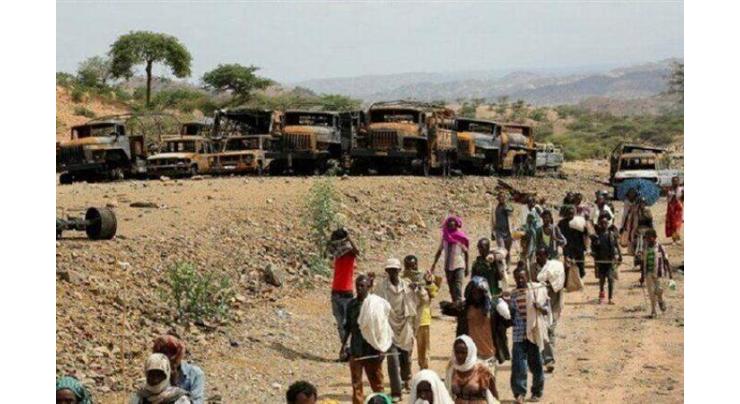
- Home
- World
- News
- Possible Sanctions on Ethiopia Counterproductive, Will Inflict Damage on Civilians - Envoy
Possible Sanctions On Ethiopia Counterproductive, Will Inflict Damage On Civilians - Envoy
Fahad Shabbir (@FahadShabbir) Published November 15, 2021 | 11:55 AM

Possible sanctions against Addis Ababa will both be ineffective and damaging for the civilians, Ethiopian Ambassador to the United States Fitsum Arega told Sputnik
WASHINGTON (UrduPoint News / Sputnik - 15th November, 2021) Possible sanctions against Addis Ababa will both be ineffective and damaging for the civilians, Ethiopian Ambassador to the United States Fitsum Arega told Sputnik.
"The prospect of future sanctions against the Ethiopian Government will prove counterproductive. Indiscriminate and punitive use of sanctions inflicts needles collateral damage on civilians and innocent citizens who have no part in a conflict," Arega said.
On Friday, the United States announced Ethiopia-related sanctions against two individuals and four entities, including the Eritrean Defense Forces, while a senior administration official said that Washington stands ready to pursue more Ethiopia-related sanctions, including against the rebel Tigray People's Liberation Front (TPLF).
White House Press Secretary Jen Psaki said Friday that the US is delaying sanctions against the Ethiopian military and the TPLF rebel group in order to leave space for the parties to settle the conflict through talks.
"To be frank, sanctions of any kind will not be necessary if members of the international community who claim to seek peace are able to induce the TPLF to seek peace and resolve the dire situation in the region," Arega said. "If the TPLF disarms, demobilizes and turns over the few masterminds who planned and executed this ill-fated misadventure resulting in dire humanitarian conditions, things can normalize very rapidly."
Arega went on to say that economic sanctions lead to an increase in the poverty gap and deprived sections of the population are impacted the most.
"The history of sanctions shows for the most part sanctions fail to achieve their aims and disproportionately impact the poor," he said. "They have damaging effect on income inequality and impact ordinary people more than the elites and leaders who often manage around the sanctions.
They have a negative impact on economic development. It is ironic that the very people who want to help the poor hurt the poor by such sanctions."
US President Joe Biden said earlier in November that the United States will remove Ethiopia, Mali, and Guinea from the list of beneficiaries under the African Growth and Opportunity Act (AGOA), which provides access to duty-free trade, if they fail to address human rights violations by January 1.
Arega pointed out that the victims of that sanction would be mostly rural young women who have little to no opportunity to become self-sufficient and support their families.
"If they are laid off from factories that supply the export market under AGOA, they will be doubly victimized by poverty," he explained. "The unfortunate fact is that there are over 200,000 people who will be affected by the AGOA exclusion. Moreover, other than the young women, it is the investors who will be hurt because of loss of business. Parties that have nothing to do with the conflict bear the brunt of sanctions."
"AGOA sanctions do not affect Ethiopian government forces. That is why I find it incomprehensible why it is necessary to impose such sanctions," he added. "I do not believe the cause of uplifting women out of poverty or providing them a fighting chance in life is supported by AGOA sanctions."
Ethiopia has been embroiled in a domestic conflict since last November when the central government accused the Tigray People's Liberation Front of attacking a military base and launched a counter operation in the northern parts of the country. Neighboring Eritrea supported the Ethiopian authorities, although in the spring of 2021 it said it was withdrawing its troops from the Tigray region.
Related Topics
Recent Stories

Expanded, rebranded National Women's One-Day tournament to start tomorrow

President, Saudi FM discuss challenges being faced by Muslim Ummah

Bushra Ansari ties knot with Iqbal Hussain

Shaheen likely to miss initial two matches of Pak Vs NZ T20I series

LHC suspends PML-N Rana Arshad’s victory notification from PP-133

Faizabad Dharna Commission exonerates former Spy Chief Faiz Hameed

Pakistan calls for enhanced information integrity on digital platforms

Pakistan starts discussion with IMF about new loan agreement: Finance Minister

Currency Rate In Pakistan - Dollar, Euro, Pound, Riyal Rates On 16 April 2024

Today Gold Rate in Pakistan 16 April 2024

Govt hikes petrol price by Rs4.53 per litre for next fortnight

British Investment Group, One Homes, Expected to launch second development at Ce ..
More Stories From World
-
Middle East on edge after Israel vows 'response' to Iran strikes
39 minutes ago -
Paris 2024 Games torch relay launched in Olympics birthplace
39 minutes ago -
Chinese electronic enterprises plug into African market
1 hour ago -
Milan design fair opens with sustainability and David Lynch
1 hour ago -
Ukraine 'ran out' of missiles to defend key plant, Zelensky says
2 hours ago -
Chairman, CIDCA awarded Hilal-e-Quaid-Azam
2 hours ago
-
Paris 2024 Games flame lit in ancient Olympia
3 hours ago -
'Go home': Overtourism sparks backlash in Spain
3 hours ago -
Massive fire engulfs Copenhagen's historic stock exchange
3 hours ago -
Over 50 prospective Trump jurors say unable to be fair, excused
4 hours ago -
New Godzilla x Kong film tops Chinese box office
4 hours ago -
Flash floods leave at least 1,000 homeless in northern Tanzania
4 hours ago